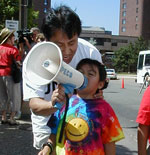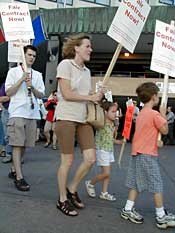Hotel Strike a Possibility in Twin Cities
By Andrew Haeg
June 9, 2000
Members of the Hotel Workers Union Local 17 rallied in downtown Minneapolis to dramatize their vote last night to reject a wage and benefits offer from the management of nine Twin Cities hotels. The union says they will go out on strike unless the hotels improve their offer. Workers and supporters were joined by Reverend Jesse Jackson, Senator Paul Wellstone, and others who led a surprise attempt to bargain with management.
AREA HOTELS are entering their busiest season, and 50,000 members of Alcoholics Anonymous are convening here at the end of the month. Whether by chance or design, it's a propitious time for the union to press its case, but union officials said that also explained why there were few rank-and-file members among the several hundred supporters at the rally. Those who did show up, like Nyima Dazom , say hotel management's giving them a raw deal. "Hotels are making money, we ain't," he said.
Dazom, who's from Tibet, says he'll make $18,000 this year. If the union achieves its demands, he'll make between $24,000 and $25,000 a year by 2005. A union official says, under the hotel's offer, Dazom would only earn about $19,000 a year after five years.
That helps explain why 94 percent of all union members who voted rejected the hotels' offer. In addition to better wages, they're demanding health coverage for their dependents, and a better pension plan.
Hotel representatives say the union has backtracked and rejected what initially appeared to be an acceptable offer. They say that they've offered to boost pensions, and that the union's demands are unrealistic.
Michael Colloton, attorney for Moss and Barnett, and a negotiator for hotel management, says the union should focus more an negotiations than on rabble rousing. "If the union put as much energy into settling this contract than raising a ruckus, then we'd have been done a long time ago," he said.
Today's rally began in front of the Minneapolis regal hotel. Picketers circled, and the circle grew as the morning wore on. But the protest hit its stride when Reverend Jesse Jackson showed up. Hand in hand with associates, Jackson underscored the fact that this protest is part of a bigger, national campaign.
The national AFL-CIO and member unions around the country are stepping up their efforts to organize low-paid workers, many of whom are newly arrived to the United States. Successful earlier efforts by the Twin Cities hotel employees union to organize undocumented hotel employees helped persuade the AFL-CIO to embrace new immigrants as a source of new vitality for the labor movement, rather than shun them as threats to American workers.
Macalester Professor and labor activist Peter Rachleff says immigrants are less fearful of organizing in today's strong economy and tight labor market.
Jackson led rally participants on a march to the Minneapolis Hilton. There, Jackson joined Senator Paul Wellstone, Minneapolis City Council President Jackie Cherryhomes, union leaders including Hotel Employee Local 17 principal officer Jaye Rykunyk, and U.S. Senate candidate Jerry Janezich.
After the speeches, Jackson led the picketers past police to the hotel's door, in an impromptu attempt to bargain with management. Hotel guests peered through the glass windows, as an impassive hotel manager initially refused the group entry.
After a couple tense minutes, the manager relented, but allowed only Jackson and Wellstone and local union official Jaye Rykunyk and one other to enter. Meanwhile, picketers continued their cries outside, awaiting a possible surprise agreement.
After more than a half an hour, Jackson Wellstone and Rykunyk re-emerged. They didn't reach any conclusion, but the one hotel manager they met with reportedly agreed, tentatively, to get together with the other hotel managers and continue negotiations next week.
Both sides say they still hope to reach agreement before the union's strike deadline next Friday. If they fail, the union says its members will walk off the job. That would hurt more than the nine Twin Cities hotels who employ Local 17 members. Greg Ortale, president of the Greater Minneapolis Convention and Visitors Association, says he's worried a strike would repel potential tourists and businesspeople.
Ortale and others hope the two sides can avoid a strike, and avoid upsetting what will likely be a prosperous and busy summer for the Twin Cities.
By Andrew Haeg
June 9, 2000
|
|
RealAudio 3.0 |
Members of the Hotel Workers Union Local 17 rallied in downtown Minneapolis to dramatize their vote last night to reject a wage and benefits offer from the management of nine Twin Cities hotels. The union says they will go out on strike unless the hotels improve their offer. Workers and supporters were joined by Reverend Jesse Jackson, Senator Paul Wellstone, and others who led a surprise attempt to bargain with management.
| |
|
|
|
||
AREA HOTELS are entering their busiest season, and 50,000 members of Alcoholics Anonymous are convening here at the end of the month. Whether by chance or design, it's a propitious time for the union to press its case, but union officials said that also explained why there were few rank-and-file members among the several hundred supporters at the rally. Those who did show up, like Nyima Dazom , say hotel management's giving them a raw deal. "Hotels are making money, we ain't," he said.
Dazom, who's from Tibet, says he'll make $18,000 this year. If the union achieves its demands, he'll make between $24,000 and $25,000 a year by 2005. A union official says, under the hotel's offer, Dazom would only earn about $19,000 a year after five years.
That helps explain why 94 percent of all union members who voted rejected the hotels' offer. In addition to better wages, they're demanding health coverage for their dependents, and a better pension plan.
Hotel representatives say the union has backtracked and rejected what initially appeared to be an acceptable offer. They say that they've offered to boost pensions, and that the union's demands are unrealistic.
Michael Colloton, attorney for Moss and Barnett, and a negotiator for hotel management, says the union should focus more an negotiations than on rabble rousing. "If the union put as much energy into settling this contract than raising a ruckus, then we'd have been done a long time ago," he said.
Today's rally began in front of the Minneapolis regal hotel. Picketers circled, and the circle grew as the morning wore on. But the protest hit its stride when Reverend Jesse Jackson showed up. Hand in hand with associates, Jackson underscored the fact that this protest is part of a bigger, national campaign.
The national AFL-CIO and member unions around the country are stepping up their efforts to organize low-paid workers, many of whom are newly arrived to the United States. Successful earlier efforts by the Twin Cities hotel employees union to organize undocumented hotel employees helped persuade the AFL-CIO to embrace new immigrants as a source of new vitality for the labor movement, rather than shun them as threats to American workers.
Macalester Professor and labor activist Peter Rachleff says immigrants are less fearful of organizing in today's strong economy and tight labor market.
Jackson led rally participants on a march to the Minneapolis Hilton. There, Jackson joined Senator Paul Wellstone, Minneapolis City Council President Jackie Cherryhomes, union leaders including Hotel Employee Local 17 principal officer Jaye Rykunyk, and U.S. Senate candidate Jerry Janezich.
| |
|
|
|
||
After the speeches, Jackson led the picketers past police to the hotel's door, in an impromptu attempt to bargain with management. Hotel guests peered through the glass windows, as an impassive hotel manager initially refused the group entry.
After a couple tense minutes, the manager relented, but allowed only Jackson and Wellstone and local union official Jaye Rykunyk and one other to enter. Meanwhile, picketers continued their cries outside, awaiting a possible surprise agreement.
After more than a half an hour, Jackson Wellstone and Rykunyk re-emerged. They didn't reach any conclusion, but the one hotel manager they met with reportedly agreed, tentatively, to get together with the other hotel managers and continue negotiations next week.
Both sides say they still hope to reach agreement before the union's strike deadline next Friday. If they fail, the union says its members will walk off the job. That would hurt more than the nine Twin Cities hotels who employ Local 17 members. Greg Ortale, president of the Greater Minneapolis Convention and Visitors Association, says he's worried a strike would repel potential tourists and businesspeople.
Ortale and others hope the two sides can avoid a strike, and avoid upsetting what will likely be a prosperous and busy summer for the Twin Cities.


